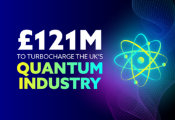Activity-Induced Ferromagnetism in One-Dimensional Quantum Many-Body Systems
Activity-Induced Ferromagnetism in One-Dimensional Quantum Many-Body Systems
Researchers Kazuaki Takasan and Kyogo Kawaguchi of the University of Tokyo with Kyosuke Adachi of RIKEN, Japan's largest comprehensive research institution, have demonstrated that ferromagnetism, an ordered state of atoms, can be induced by increasing particle motility and that repulsive forces between atoms are sufficient to maintain it. The discovery not only extends the concept of active matter to quantum systems but also contributes to the development of novel technologies that rely on the magnetic properties of particles, such as magnetic memory and quantum computing. The findings were published in the journal Physical Review Research.
Physicists Discover a Novel Quantum State in an Elemental Solid
Physicists Discover a Novel Quantum State in an Elemental Solid
Physicists have observed a novel quantum effect termed “hybrid topology” in a crystalline material. This finding opens up a new range of possibilities for the development of efficient materials and technologies for next-generation quantum science and engineering.
MIT Researchers Discover “Neutronic Molecules”
MIT Researchers Discover “Neutronic Molecules”
Study shows neutrons can bind to nanoscale atomic clusters known as quantum dots. The finding may provide insights into material properties and quantum effects.
Kvantify Launches Its First Product to Improve Drug Discovery
Kvantify Launches Its First Product to Improve Drug Discovery
In a groundbreaking advancement for computational drug discovery, Danish quantum company Kvantify is proud to announce the launch of its first product, Kvantify Koffee, today. This innovative product aims to complement and reduce costly and time-consuming laboratory experiments by calculating a critical parameter in screening and selecting new drug candidates: Unbinding Kinetics. Kvantify Koffee adds value using classical computers today and is poised to offer even greater value as quantum computer hardware matures.
For the First Time, Quantum-Enhanced Generative AI Generates Viable Cancer Drug Candidates
For the First Time, Quantum-Enhanced Generative AI Generates Viable Cancer Drug Candidates
Zapata Computing, Inc. , the Industrial Generative AI company, today announced that its scientists, in collaboration with Insilico Medicine and the University of Toronto have demonstrated the first instance of a generative model running on quantum hardware outperforming state-of-the-art classical models in generating viable cancer drug candidates. The research points to a promising future of hybrid quantum generative AI for drug discovery using today’s quantum devices.
D-Wave and Zapata AI Announce Strategic Technical and Commercial Collaboration to Advance Quantum-Enabled Machine Learning
D-Wave and Zapata AI Announce Strategic Technical and Commercial Collaboration to Advance Quantum-Enabled Machine Learning
Partnership brings together powerful generative AI and quantum computing technologies focused on building applications for accelerating new discoveries and solving complex optimization problems.
Qubit Pharmaceuticals Advances Cancer Research With HPC and AI-Powered Drug Discovery in Collaboration With French Research Institutions
Qubit Pharmaceuticals Advances Cancer Research With HPC and AI-Powered Drug Discovery in Collaboration With French Research Institutions
Qubit Pharmaceuticals, a company specializing in the discovery of new drug candidates using simulation and AI accelerated by hybrid HPC and quantum computing, and Institut Curie, France’s leading center in the fight against cancer, have announced their collaboration in the search for new therapeutic avenues to treat cancer. The project will be carried out in partnership with the Laboratoire de Microbiologie Fondamentale et Pathogénicité at the University of Bordeaux.
UNIST Research Team Develops World’s Most Efficient Quantum Dot Solar Cell
UNIST Research Team Develops World’s Most Efficient Quantum Dot Solar Cell
The world’s most efficient quantum dot (QD) solar cell has been developed by the Ulsan National Institute of Science and Technology (UNIST). A quantum dot solution and a device used in the development of the solar cell can maintain high performance even after long-term storage, taking a step closer to the commercialization of next-generation solar cells.


























